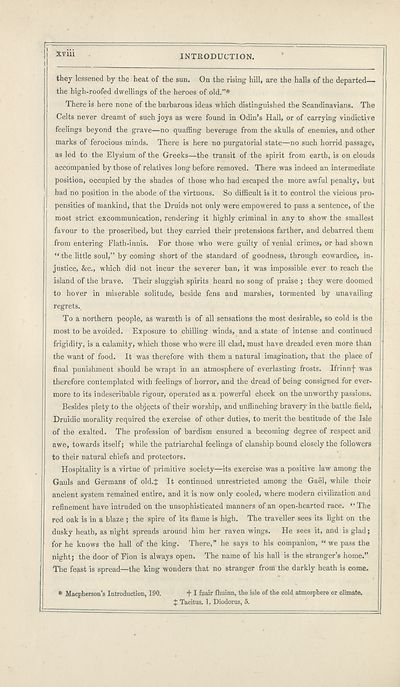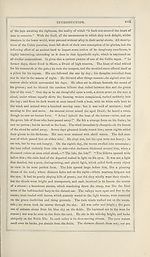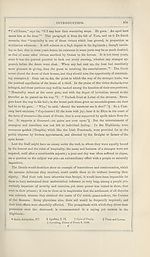Books and other items printed in Gaelic from 1871 to 1900 > Sar-obair nam bard gaelach, or, The beauties of Gaelic poetry, and lives of the Highland bards
(32) Page xviii
Download files
Complete book:
Individual page:
Thumbnail gallery: Grid view | List view

INTRODUCTION.
XV'iii
they lessened by the heat of the sun. On the rising hill, are the halls of the departed—
the high-roofed dwellings of the heroes of old.”*
There is here none of the barbarous ideas which distinguished the Scandinavians. The
Celts never dreamt of such joys as were found in Odin’s Hall, or of carrying vindictive
feelings beyond the grave—no quaffing beverage from the skulls of enemies, and other
marks of ferocious minds. There is here no purgatorial state—no such horrid passage,
as led to the Elysium of the Greeks—the transit of the spirit from earth, is on clouds
accompanied by those of relatives long before removed. There was indeed an intermediate
position, occupied by the shades of those who had escaped the more awful penalty, but
had no position in the abode of the virtuous. So difficult is it to control the vicious pro¬
pensities of mankind, that the Druids not only were empowered to pass a sentence, of the
1 most strict excommunication, rendering it highly criminal in any to show the smallest
favour to the proscribed, but they carried their pretensions farther, and debarred them
from entering Flath-innis. For those who were guilty of venial crimes, or had shown
“ the little soul,” by coming short of the standard of goodness, through cowardice, in¬
justice, &c., which did not incur the severer ban, it was impossible ever to reach the
! island of the brave. Their sluggish spirits heard no song of praise ; they were doomed
to hover in miserable solitude, beside fens and marshes, tormented by unavailing
regrets.
To a northern people, as warmth is of all sensations the most desirable, so cold is the
most to be avoided. Exposure to chilling winds, and a state of intense and continued
frigidity, is a calamity, which those who were ill clad, must have dreaded even more than
the want of food. It was therefore with them a natural imagination, that the place of
final punishment should be wrapt in an atmosphere of everlasting frosts. Ifrinnf was
therefore contemplated with feelings of horror, and the dread of being consigned for ever¬
more to its indescribable rigour, operated as a powerful check on the unworthy passions.
Besides piety to the objects of their worship, and unflinching bravery in the battle field,
Druidic morality required the exercise of other duties, to merit the beatitude of the Isle
of the exalted. The profession of bardism ensured a becoming degree of respect and
awe, towards itself; while the patriarchal feelings of clanship bound closely the followers
to their natural chiefs and protectors.
Hospitality is a virtue of primitive society—its exercise was a positive law among the
Gauls and Germans of old.J It continued unrestricted among the Gael, while their
ancient system remained entire, and it is now only cooled, where modern civilization and
refinement have intruded on the unsophisticated manners of an open-hearted race. “ The
red oak is in a blaze ; the spire of its flame is high. The traveller sees its light on the
dusky heath, as night spreads around him her raven wings. He sees it, and is glad;
for he knows the hall of the king. There,” he says to his companion, “ we pass the
night; the door of Fion is always open. The name of his hall is the stranger’s home.”
The feast is spread—the king wonders that no stranger from the darkly heath is come.
* Macpherson’s Introduction, 190. + I fuair fhuinn, the isle of the cold atmosphere or climate.
J Tacitus. 1. Diodorus, 5.
XV'iii
they lessened by the heat of the sun. On the rising hill, are the halls of the departed—
the high-roofed dwellings of the heroes of old.”*
There is here none of the barbarous ideas which distinguished the Scandinavians. The
Celts never dreamt of such joys as were found in Odin’s Hall, or of carrying vindictive
feelings beyond the grave—no quaffing beverage from the skulls of enemies, and other
marks of ferocious minds. There is here no purgatorial state—no such horrid passage,
as led to the Elysium of the Greeks—the transit of the spirit from earth, is on clouds
accompanied by those of relatives long before removed. There was indeed an intermediate
position, occupied by the shades of those who had escaped the more awful penalty, but
had no position in the abode of the virtuous. So difficult is it to control the vicious pro¬
pensities of mankind, that the Druids not only were empowered to pass a sentence, of the
1 most strict excommunication, rendering it highly criminal in any to show the smallest
favour to the proscribed, but they carried their pretensions farther, and debarred them
from entering Flath-innis. For those who were guilty of venial crimes, or had shown
“ the little soul,” by coming short of the standard of goodness, through cowardice, in¬
justice, &c., which did not incur the severer ban, it was impossible ever to reach the
! island of the brave. Their sluggish spirits heard no song of praise ; they were doomed
to hover in miserable solitude, beside fens and marshes, tormented by unavailing
regrets.
To a northern people, as warmth is of all sensations the most desirable, so cold is the
most to be avoided. Exposure to chilling winds, and a state of intense and continued
frigidity, is a calamity, which those who were ill clad, must have dreaded even more than
the want of food. It was therefore with them a natural imagination, that the place of
final punishment should be wrapt in an atmosphere of everlasting frosts. Ifrinnf was
therefore contemplated with feelings of horror, and the dread of being consigned for ever¬
more to its indescribable rigour, operated as a powerful check on the unworthy passions.
Besides piety to the objects of their worship, and unflinching bravery in the battle field,
Druidic morality required the exercise of other duties, to merit the beatitude of the Isle
of the exalted. The profession of bardism ensured a becoming degree of respect and
awe, towards itself; while the patriarchal feelings of clanship bound closely the followers
to their natural chiefs and protectors.
Hospitality is a virtue of primitive society—its exercise was a positive law among the
Gauls and Germans of old.J It continued unrestricted among the Gael, while their
ancient system remained entire, and it is now only cooled, where modern civilization and
refinement have intruded on the unsophisticated manners of an open-hearted race. “ The
red oak is in a blaze ; the spire of its flame is high. The traveller sees its light on the
dusky heath, as night spreads around him her raven wings. He sees it, and is glad;
for he knows the hall of the king. There,” he says to his companion, “ we pass the
night; the door of Fion is always open. The name of his hall is the stranger’s home.”
The feast is spread—the king wonders that no stranger from the darkly heath is come.
* Macpherson’s Introduction, 190. + I fuair fhuinn, the isle of the cold atmosphere or climate.
J Tacitus. 1. Diodorus, 5.
Set display mode to:
![]() Universal Viewer |
Universal Viewer | ![]() Mirador |
Large image | Transcription
Mirador |
Large image | Transcription
Images and transcriptions on this page, including medium image downloads, may be used under the Creative Commons Attribution 4.0 International Licence unless otherwise stated. ![]()
| Permanent URL | https://digital.nls.uk/107579030 |
|---|
| Description | Out-of-copyright books printed in Gaelic between 1631 and 1900. Also some pamphlets and chapbooks. Includes poetry and songs, religious books such as catechisms and hymns, and different editions of the Bible and the Psalms. Also includes the second book ever published in Gaelic in 1631. |
|---|

